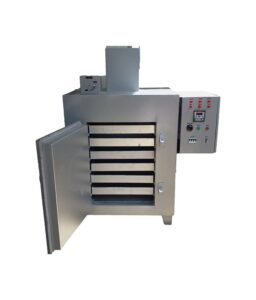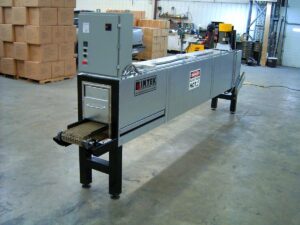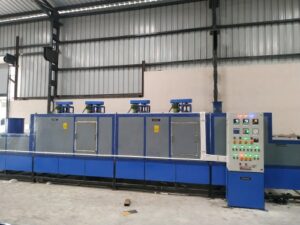What is Tray Dryer?
A tray dryer is a convectional drying equipment with enclosed insulated chambers and trays placed on top of each other in a trolley.
A tray dryer in the pharmaceutical industry is used to dry powders, granules, and other types of materials. It consists of a heated chamber with trays to place materials. The trays are usually stacked one on top of each other, and the drying process is usually done under controlled temperature and humidity conditions.

Tray dryers are a type of drying equipment used in various industries for drying solid materials or products in batch quantities. They consist of a series of trays or shelves arranged in a vertical or horizontal configuration within an enclosed chamber. Tray dryers provide controlled heat and airflow to remove moisture from the materials and facilitate drying.
Here’s a general overview of how tray dryers work:
Tray Configuration: Tray dryers feature multiple trays or shelves that are spaced apart to allow for the circulation of air between them. The trays are typically made of metal or other heat-resistant materials and have perforations or mesh surfaces to facilitate airflow.
Loading: The solid material or product to be dried is spread out on the trays in a thin layer. This ensures efficient heat transfer and allows for uniform drying throughout the batch.
Air Circulation: Tray dryers utilize a fan or blower system to circulate heated air within the drying chamber. The air is typically heated using electric heaters, gas burners, or steam coils located either within the chamber or in a separate heat source.
Temperature Control: Tray dryers have temperature controls and sensors to maintain the desired drying temperature. The temperature setting depends on the specific material being dried and the drying requirements.
Airflow Control: The drying chamber is designed to control the airflow. The heated air is introduced into the chamber from the bottom or side and then drawn out through exhaust vents or ducts. This allows for efficient removal of moisture from the materials and helps maintain consistent drying conditions.
Drying Process: Once the trays are loaded and the desired temperature and airflow are set, the drying process begins. The heated air flows over and through the material, absorbing moisture and carrying it away. As the drying progresses, the moisture evaporates, and the material gradually becomes dry.
Monitoring and Adjustments: During the drying process, operators monitor the drying conditions and make necessary adjustments to temperature, airflow, or drying time if required. This ensures optimal drying performance and prevents under-drying or over-drying of the material.
Unloading: Once the drying process is complete, the trays are removed from the drying chamber, and the dried material is unloaded. The material may undergo additional processing or packaging depending on its intended use.
Tray dryers are commonly used in industries such as food processing, pharmaceuticals, chemicals, ceramics, and agriculture. They offer advantages such as batch processing, versatility in handling various materials, and the ability to control drying conditions precisely. Tray dryers are efficient for drying solid materials that require gentle drying or those that are sensitive to temperature fluctuations.
Tray Dryer Working
- Wet solid is loaded into trays.
- Place the tray in the chamber.
- Fresh air is introduced through the inlet, which passes through the heaters and gets heated up.
- The hot air is circulated by means of fans at 2 to 5 m/s.
- The water is picked up by air.
- As the water evaporated from the surface, the water diffuses from the interior of the solid by capillary action.
- These events occur in a single pass of air.
- The time of contact is short and the amount of water picked up in a single pass is small.
- Moist air is discharged through the outlet. thus constant temperature and uniform airflow over the material can be maintained for achieving uniform drying.
Uses:
- Sticky materials, plastic substances, granular mass or crystalline materials, precipitates, and paste can be dried in a tray dryer.
- Drying crude drugs, Herbs, botanicals chemicals, powders, tablet granules, or parts of the equipment.
Advantage
- In try dryer, handling of materials (loading and unloading) can be done without losses
- Try the dryer is operated batch-wise
- Most efficient and consume less energy
- As it is available in different sizes with different price ranges, so its becomes easy to control capital cost
- It can be used on small scale as well as on a medium scale
- It reduces the drying time by removing moisture at an efficient rate.
- Easy to operate and handle
- Easy to installed
Disadvantage
- The tray dryer required more labor to load and unload hence the cost increase
- The process is time-consuming depending on the materials
- The dusty solids are not drier in a tray dryer
- Tray dryer has Limited scalability because Tray dryers are used only to dry low batch size at a time, which limits the scalability of the manufacturing process.
- It is not suitable for Thermolabile materials, liquids, and slurries.
- It has limited capacity; so it can not use in a large-scale production
Worldwide Exports Location:
Following Countries: Afghanistan, Albania, Algeria, Andorra, Angola, Antigua And Barbuda, Argentina, Armenia, Australia, Austria, Azerbaijan, Bahamas, Bahrain, Bangladesh, Barbados, Belarus, Belgium, Belize, Benin, Bhutan, Bolivia, Bosnia And Herzegovina, Botswana, Brazil, Brunei, Bulgaria, Burkina Faso, Burundi, Cabo Verde, Cambodia, Cameroon, Canada, Central African Republic (CAR), Chad, Chile, Colombia, Comoros, Democratic Republic Of The Congo, Republic Of The Congo, Costa Rica, Cote D’Ivoire, Croatia, Cuba, Cyprus, Czech Republic, Denmark, Djibouti, Dominica, Dominican Republic, Ecuador, Egypt, El Salvador, Equatorial Guinea, Eritrea, Estonia, Ethiopia, Fiji, Finland, France, Gabon, Gambia, Georgia, Germany, Ghana, Greece, Grenada, Guatemala, Guinea, Guinea-Bissau, Guyana, Haiti, Honduras, Hungary, Iceland, India, Indonesia, Iran, Iraq, Ireland, Israel, Italy, Jamaica, Japan, Jordan, Kazakhstan, Kenya, Kiribati, Kosovo, Kuwait, Kyrgyzstan, Laos, Latvia, Lebanon, Lesotho, Liberia, Libya, Liechtenstein, Lithuania, Luxembourg, Macedonia (FYROM), Madagascar, Malawi, Malaysia, Maldives, Mali, Malta, Marshall Islands, Mauritania, Mauritius, Mexico, Micronesia, Moldova, Monaco, Mongolia, Montenegro, Morocco, Mozambique, Myanmar (Burma), Namibia, Nauru, Nepal, Netherlands, New Zealand, Nicaragua, Niger, Nigeria, North Korea, Norway, Oman, Pakistan, Palau, Palestine, Panama, Papua New Guinea, Paraguay, Peru, Philippines, Poland, Portugal, Qatar, Romania, Russia, Rwanda, Saint Kitts And Nevis, Saint Lucia, Saint Vincent And The Grenadines, Samoa, San Marino, Sao Tome And Principe, Saudi Arabia, Senegal, Serbia, Seychelles, Sierra Leone, Singapore, Slovakia, Slovenia, Solomon Islands, Somalia, South Africa, South Korea, South Sudan, Spain, Sri Lanka, Sudan, Suriname, Swaziland, Sweden, Switzerland, Syria, Taiwan, Tajikistan, Tanzania, Thailand, Timor-Leste, Togo, Tonga, Trinidad And Tobago, Tunisia, Turkey, Turkmenistan, Tuvalu, Uganda, Ukraine, United Arab Emirates (UAE), United Kingdom (UK), United States Of America (USA), Uruguay, Uzbekistan, Vanuatu, Vatican City (Holy See), Venezuela, Vietnam, Yemen, Zambia, Zimbabwe.
India Location –
Maharashtra, Mumbai, Pune, Nagpur, Nashik, Virar, Palghar, Aurangabad, Bhiwandi, Thane, Amravati, Malegaon, Kolhapur, Nanded, Sangli ,Jalgaon, Akola, Latur, Ahmadnagar, Dhule, Ichalkaranji, Chandrapur, Parbhani, Jalna, Bhusawal, Navi Mumbai, Raigad, Panvel, Bangalore, Karnataka, Ahmedabad, Gujarat, Chennai, Tamil Nadu, Surat, Coimbatore, Vadodara, Indore, Madhya Pradesh, Bhubaneswar, Orissa, Hyderabad, Andhra Pradesh, Jamshedpur, Jharkhand, Kolkata, West Bengal ,Delhi, Jaipur, Rajasthan, Kochi, Kerala, Chandigarh, Punjab, Dehradun, Uttarakhand , Lucknow, Uttar Pradesh, Visakhapatnam, Andhra Pradesh, Guwahati, Assam, Amritsar, Mangalore, Noida, Gurgaon, Haryana, Bhopal, Madhya Pradesh, Aurangabad, Faridabad, Allahabad, Prayagraj, Jodhpur.




